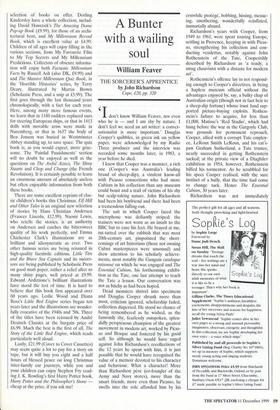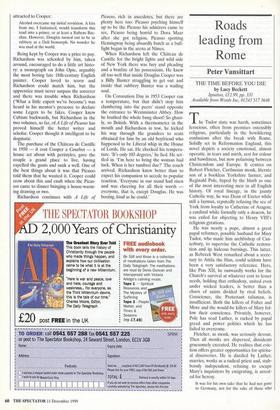A Bunter with a wailing soul
William Feaver
THE SORCERER'S APPRENTICE by John Richardson Cape, £20, pp. 320
don't know William Feaver, nor even who he is — and I am shy by nature. I don't feel we need an art writer: a conver- sationalist is more important.' Douglas Cooper's quibbles, in green ink on yellow paper, were acknowledged by my Radio Three producer and the interview was recorded some months later, in 1983, a year before he died. .
I knew that Cooper was a monster, a rich one (Cooper's was Australia's leading brand of sheep-dip), a virulent know-all with Picasso connections who had more Cubism in his collection than any museum could boast and a trail of victims of his shy but scalp-taking nature. John Richardson had been his boyfriend and there had been a tremendous falling-out.
The suit in which Cooper faced the microphone was defiantly striped; the trainers were not worn as an insult to the BBC but to ease his feet. He brayed at me, tut-tutted over the rubbish that was most 20th-century art, pinpointed the short- comings of art historians (those not owning Cubist masterpieces were unsound) and drew attention to his scholarly achieve- ments, most notably the Gauguin catalogue misonne on which he was engaged and The Essential Cubism, his forthcoming exhibi- tion at the Tate, one last attempt to teach the Tate a lesson. Our conversation was not as bitchy as had been hoped.
Dead monsters shrivel into specimens and Douglas Cooper shrunk more than most, criticism ignored, scholarship faded, collection dispersed. He stood no chance of being remembered as he wished, as the famously shy, fearlessly outspoken, splen- didly perspicuous champion of the greatest movement in modern art, worked by Picas- so and Braque and fostered by his good self. So although he would have raged against John Richardson's recollections of the 12 years he spent with him, it is just possible that he would have recognised the value of a memoir devoted to his character and behaviour. What a character! More than Richardson pere (co-founder of the Army and Navy stores), more than the smart friends, more even than Picasso, he swells into the role afforded him by his erstwhile protégé, bobbing, hissing, menac- ing, smothering, wonderfully reinflated, immortally absurd.
Richardson's years with Cooper, from 1949 to 1961, were spent touring Europe, settling in Provence, keeping in with Picas- so, strengthening his collection and con- ducting vendettas, notably against John Rothenstein of the Tate, Cooperishly described by Richardson as 'a toady, a smug chauvinist with a distaste for modern art'.
Rothenstein's offence lay in not respond- ing enough to Cooper's directives, in being a hapless museum official without the advantages enjoyed by, say, a bulky chap of Australian origin (though not in fact heir to a sheep-dip fortune) whose trust fund sup- ported picture-buying exploits. Rothen- stein's failure to acquire, for less than £1,000, Matisse's 'Red Studio', which had hung before the war in the Gargoyle Club, was grounds for permanent reproach. Cooper, allied with a corrupt Tate employ- ee, LeRoux Smith LeRoux, and his cat's- paw Graham Sutherland, a Tate trustee, nearly succeeded in getting Rothenstein sacked; at the private view of a Diaghilev exhibition in 1954, however, Rothenstein biffed his tormentor. As he scrabbled for his specs Cooper realised, with the sure instinct of a bully, that the time had come to change tack. Hence The Essential Cubism, 30 years later.
Richardson was not immediately attracted to Cooper: Alcohol overcame my initial revulsion. A kiss from me, I fantasised, would transform this toad into a prince, or at least a Rubens Bac- chus. However, Douglas turned out to be as rubbery as a Dali biomorph. No wonder he was mad at the world.
Being kept by Cooper was a price to pay. Richardson was schooled by him, taken around, encouraged to do a little art histo- ry: a monograph on John Opie, arguably the most boring late 18th-century English painter. Cooper loved to scorn and Richardson could match him, but the apprentice must never surpass the sorcerer and there was trouble when Richardson ('What a little expert we've become') was heard in his mentor's presence to declare some Legers to be fakes. Cooper knew Cubism backwards, but Richardson in the two volumes, so far, of A Life of Picasso has proved himself the better writer and scholar. Cooper thought it intelligent to be dogmatic.
The purchase of the Chateau de Castille in 1950 — it cost Cooper a Courbet — a house set about with peristyles, gave the couple a grand place to live, having expelled the goats and sunk a well. One of the best things about it was that Picasso told them that he wanted it. Cooper could crow about this and exult when the Picas- sos came to dinner bringing a house-warm- ing drawing or two.
Richardson continues with A Life of Picasso, rich in anecdotes, but there are plenty here too: Picasso psyching himself up to be the Picasso his admirers came to see, Picasso being horrid to Dora Maar after she got religion, Picasso spotting Hemingway being absurdly butch as a bull- fight began in the arena at Nimes.
When Richardson left the Chateau de Castille for the bright lights and wild side of New York there was fury and pleading and a bonfire of his possessions. He knew all too well that inside Douglas Cooper was a Billy Bunter struggling to get out and inside that rubbery Bunter was a wailing soul.
On Coronation Day in 1953 Cooper ran a temperature, but that didn't stop him clambering into the peers' stand opposite the entrance to Westminster Abbey. How he loathed the whole bang shoot! So ghast- ly, so British. With a thermometer in the mouth and Richardson in tow, he kicked his way through the grandees to seats obtained for him by an old boyfriend who happened to be Liberal whip in the House of Lords. He sat. He checked his tempera- ture. 'It's only 103 degrees,' he lied. He set- tled in. 'I'm here to bring the woman bad luck. When is her tumbrel due?' The coach arrived. Richardson knew better than to expect his companion to accede to popular reaction. 'Everyone in our stand had risen and was cheering for all their worth everyone, that is, except Douglas. He was booing, loud as he could.'



























































































 Previous page
Previous page